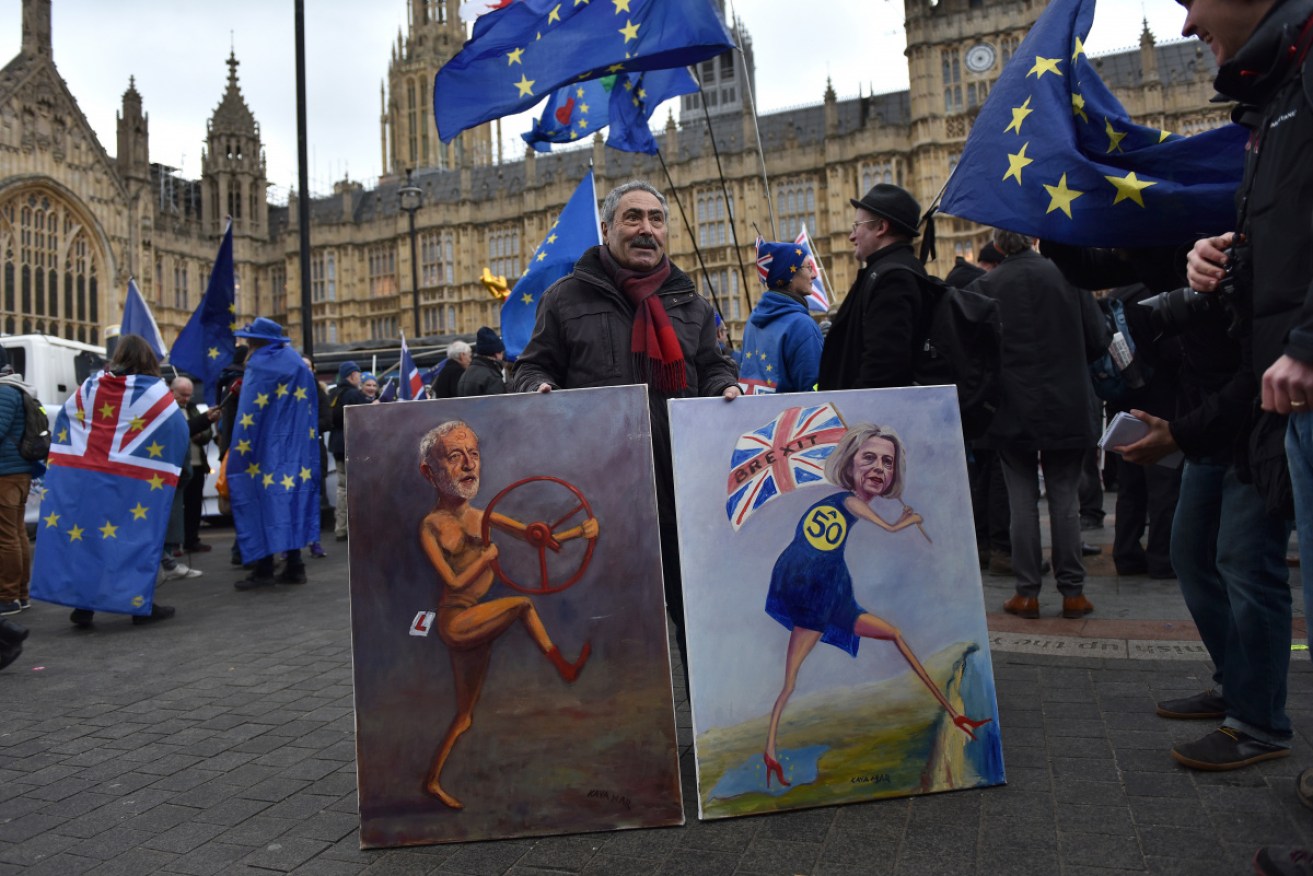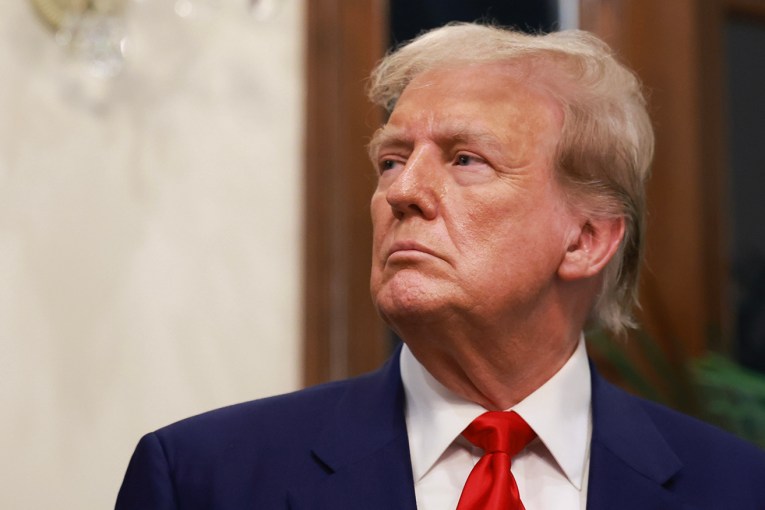Theresa May fights to survive ahead of no-confidence vote


Protestors outside the British Parliament at Westminister as the Brexit crisis unfolds. Photo: Getty
Theresa May is fighting to remain UK Prime Minister after the crushing defeat on Wednesday morning (AEDT) of her proposed Brexit deal in the House of Commons prompted a no-confidence motion in her Government.
The prospect of a disorderly exit from the European Union on March 29 is now a live option, with MPs voting down the proposal 432 to 202 – the heaviest parliamentary defeat for a government in recent British history.
Opposition Leader Jeremy Corbyn immediately tabled a motion of no confidence in the Government and MPs will cast their votes on Thursday morning (AEDT).
The Brexit fiasco has triggered the deepest political crisis in 50 years and could lead to a disorderly exit from the EU or even to a reversal of the 2016 decision to leave.
With the clock ticking down to March 29, the date set in law for Brexit, the United Kingdom must grapple with how, or even whether, to exit the European project that it joined in 1973.

Parliamentarians rejected Theresa
May’s deal. Photo: PA
“It is clear that the House does not support this deal, but tonight’s vote tells us nothing about what it does support,” Mrs May told parliament, moments after the result was announced.
More than 100 of Mrs May’s own Conservative lawmakers – both Brexiteers and supporters of EU membership – joined forces to vote down the deal, leading to the worst parliamentary defeat for a government in recent British history.
The humiliating loss, the first British parliamentary defeat of a treaty since 1864, marks the collapse of her two-year strategy of forging an amicable divorce with close ties to the EU after the March 29 exit.
Mrs May’s spokesman told reporters that her deal could still form the basis of an agreement with the EU, but opponents disagreed.
“The EU will see that it must now offer better terms to the UK. If it does not, we must leave to trade on WTO terms,” David Jones, a Conservative pro-Brexit former minister, said.
The small Northern Irish DUP party, which props up May’s minority government and refused to back the deal, said it would still stand behind May in the no-confidence vote. The pro-Brexit Conservatives who were the most vehement opponents of her deal also said they would support her.
The EU said the Brexit deal remained the best and only way to ensure an orderly withdrawal.
Austrian Chancellor Sebastian Kurz said there would be no further renegotiation of the agreement and EU Commission President Jean-Claude Juncker said it would intensify preparations for a no-deal Brexit.
Donald Tusk, the chairman of EU leaders, took to Twitter to suggest Britain should now consider reversing Brexit.
Tweet from @eucopresident
The Sterling currency rallied more than a cent against the US dollar, on some expectations that the scale of the defeat might force lawmakers to pursue other options. The Australian dollar was steady at 71.94.
Mrs May said she would reach out to opposition parties to forge a way ahead. But across the British political spectrum, opponents of her deal said it was dead.
Ever since Britain voted by 52-48 per cent to leave the EU in a referendum in June 2016, the political class has been debating how to leave the European project forged by France and Germany after the devastation of World War Two.
While the country is divided over EU membership, most agree that the world’s fifth largest economy is at a crossroads and that its choices over Brexit will shape the prosperity of future generations.
The ABC has compiled this view of how the process could work from here:
When the vote will be held
The Opposition Labour Party, backed by other smaller opposition parties, has put forward a motion that states: “That this House has no confidence in Her Majesty’s Government.”

Opposition leader Jeremy Corbyn has tabled a no confidence motion. Photo: AAP
Mr Corbyn will open the debate on the motion at about 1pm local time (midnight tonight, AEDT). Mrs May will also speak in the debate and it will last until 7pm (6am AEDT).
MPs will then vote on the motion at 7pm (6am AEDT), with the result due at around 7.15pm (6.15am AEDT).
There are 650 MPs in the House of Commons.
Mrs May’s Government needs 318 votes to win the vote, as seven members of the Irish nationalist Sinn Fein party do not sit, four speakers do not vote and four politicians who help count votes, known as tellers, are not counted.
What if the Government wins?
The Government continues in office. However, there are no restrictions on how soon another confidence vote can be called, so Labour could put forward another no-confidence motion at any point.
Mrs May would have to return to Parliament with a new proposal in the hopes of winning the extra votes she needs to get the deal across the line.
However, while the majority of Parliament was against her first proposal, MPs’ reasons for voting against it varied greatly, with some MPs wanting to remain in the EU, and some wanting a no-deal Brexit.
Coming up with a deal to satisfy a majority would be a challenge.
What if the Government loses?
Mrs May does not have to resign. A 14-day period is triggered in which any party, including Mrs May’s Conservatives, can seek to form a government.
To do this they would have to win a confidence vote in the House of Commons.
If a new government cannot be formed within 14 days, an election is triggered.
What are the chances of Mrs May losing?
Mrs May does not have an outright majority in Parliament but the DUP, the small Northern Irish party that props up her Government, has said it will support the Government.
So Mrs May would only lose if enough of her own Conservative members voted against the Government.
What are MPs saying about the vote?
Labour leader Jeremy Corbyn: “The most important issue facing us is that Government has lost the confidence of this house and this country … This house can give its verdict on the sheer incompetence of this Government and pass that motion of no confidence.”
Pro-EU Conservative MP Justine Greening, who favours holding a second referendum: “We don’t want a general election, this is not about party politics.”
Conservative Health Minister Matt Hancock: “My party is in no mood to hand over the reins to Jeremy Corbyn.”
DUP MP Sammy Wilson: “We’ll vote with the Government. We’ll vote against the Labour party’s confidence motion. We want to see the Conservative Government continuing to deliver on Brexit … We never wanted a change of government, we wanted a change of policy.”
Conservative MP Jacob Rees-Mogg, who leads an influential pro-Brexit group of Conservatives: “I will be supporting the Prime Minister.”
-with AAP






